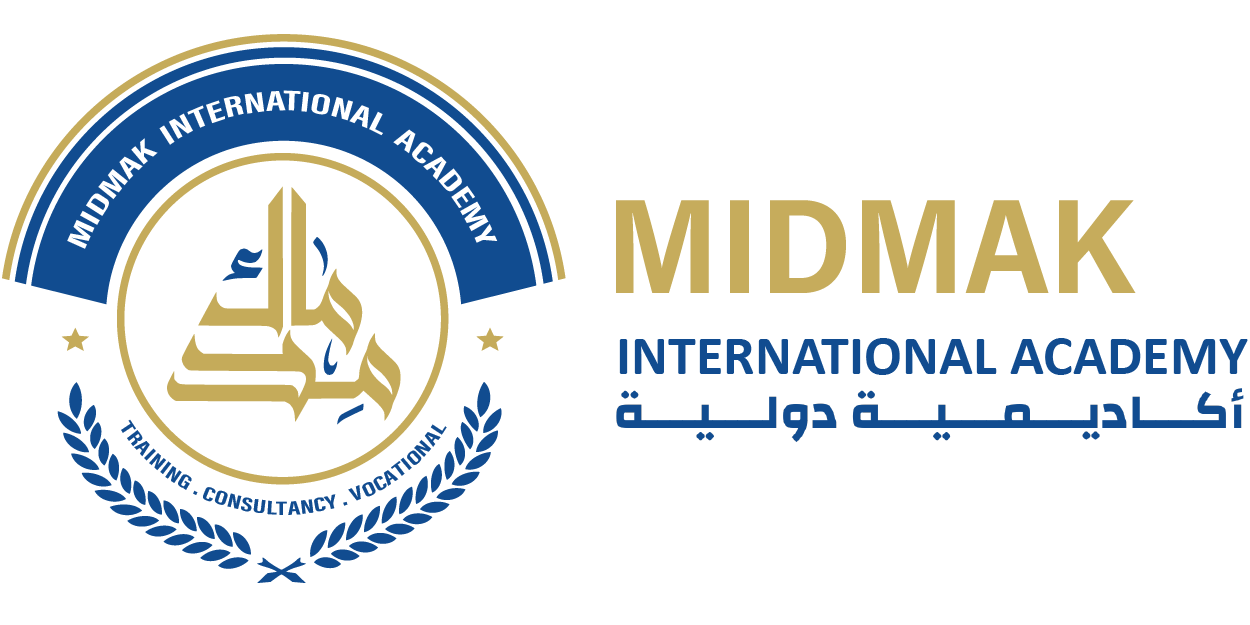Medical Competency Building Sector
Sector encoding: 01
Overview:
Midmak International Academy aims to be a leader in providing specialized training programs accredited both locally and internationally in the medical sector. It focuses on developing the scientific and practical skills of professionals in the field. The medical sector at Midmak International Academy aims to enhance healthcare professionals’ skills and improve their practices in line with global medical advancements. The Academy offers comprehensive programs covering all medical specialties, from clinical medicine, cosmetic medicine, diagnosis, and treatment, to hospital and healthcare facility management. The Academy also emphasizes medical innovation and encourages scientific research through reliable and accredited training programs endorsed by the American Board and other American and European institutions.
Target Groups:
- Doctors and medical practitioners: To improve their clinical and diagnostic skills and ensure high-quality healthcare delivery.
- Medical students and healthcare professionals: To prepare them to enter the job market efficiently by acquiring essential skills and knowledge.
- Healthcare workers: To develop their administrative skills and manage emergency cases.
- Medical researchers: To support them in developing their research and making progress in medical innovations.
- Medical students and trainees: Seeking to build a strong knowledge base and develop practical skills before entering the workforce.
- Physiotherapists: Who seek to acquire advanced skills in physical therapy techniques.
General Objectives:
- Improve clinical and diagnostic skills: Enhance the practical capabilities of doctors and nurses through the use of advanced medical simulation techniques and hands-on training in accredited medical facilities. Continuous skills evaluation through periodic assessments to measure clinical and diagnostic performance, ensuring ongoing improvement of medical professionals’ skills.
- Stay up-to-date with modern medical developments: Offer training courses on using advanced medical equipment and provide continuous training programs that allow doctors and medical staff to keep up with the latest scientific and technological advancements, including artificial intelligence in diagnosis and treatment.
- Enhance administrative efficiency in healthcare: Develop healthcare management systems by training staff on using electronic systems to manage medical records and facilitate communication between different departments in hospitals. Offer specialized training in managing multidisciplinary medical teams to improve collaboration and efficiency in care delivery.
- Promote research and innovation: Encourage the conduct of applied research focused on practical solutions to health problems, such as developing new techniques for early diagnosis or improving treatment protocols. Foster collaboration with international universities and research institutions to produce innovative research that contributes to improving global healthcare quality.
- Enhance mental health: Provide training programs for healthcare workers on handling mental health issues and raising awareness about the importance of mental health as part of comprehensive care. Offer psychological support to healthcare workers to help them cope with work pressures and ensure their psychological well-being.
Training Courses:
- Clinical and diagnostic training: Enhance examination and diagnostic skills for doctors and practitioners.
- Emergency case management: Train doctors and healthcare workers on effectively managing emergency situations.
- Medical ethics and healthcare ethics: Promote understanding and correct application of ethical and legal issues in medicine.
- Medical research and development: Support researchers in designing and conducting research and developing medical innovations.
- Non-surgical cosmetic medicine: Enable trainees to master non-surgical cosmetic techniques, such as Botox injections, fillers, lasers, and chemical peels, ensuring the provision of high-quality and safe cosmetic services. It focuses on key areas including the fundamentals of cosmetic medicine, aesthetic anatomy, injection techniques, laser techniques, skincare, safety standards and complications, clinic management, and patient communication.
- Green hospital management: Transform hospitals into environmentally and health-sustainable institutions by adopting eco-friendly practices and reducing negative environmental impacts resulting from healthcare operations. This approach centers on delivering high-quality healthcare while minimizing the negative impact on the environment and surrounding communities.
- Medical records management: Train on improving the management and organization of medical records by converting paper data to electronic formats in many hospitals and clinics, enhancing the accuracy and speed of accessing medical information. Electronic records can include information such as lab results, radiology images, medical notes, and treatment plans, facilitating coordination among doctors in different specialties.
- Clinic and medical center management: Improve the management of clinics and medical centers by training on how to deliver high-quality healthcare services effectively and sustainably. Comprehensive management of these medical facilities includes aspects such as human resource management, overseeing financial operations, coordinating between doctors and patients, and providing effective support services, such as reception, appointments, and medical records.
- Developing language skills for healthcare workers: Enable healthcare workers to communicate effectively with patients, especially in cases where they need to explain diagnoses and treatment procedures in a clear and understandable language. This builds trust and ensures comprehensive medical care. Developing language skills also facilitates cooperation with medical teams from international backgrounds, promoting knowledge and experience exchange and participation in global medical conferences. Enhancing language skills ensures medical reports and records are written clearly and accurately, reducing medical errors and facilitating information exchange among the medical team. Moreover, proficiency in languages, especially English, enables healthcare professionals to follow global medical research and studies, benefit from the latest advancements in the field, and helps doctors and researchers publish their research in international medical journals and connect with the global medical research community.
- Training in treatment techniques: Physical therapy and medication therapy.
- Training on using equipment used in non-surgical cosmetic medicine.
The Medical Competency Building Sector at Midmak International Academy represents a key pillar in enhancing healthcare quality and sustainable development in this vital field. By offering integrated and advanced training programs, this sector seeks to elevate the medical skills and knowledge of individuals, enhancing their ability to provide exceptional healthcare and stay current with the latest medical advancements. The sector empowers trainees to understand and apply the latest medical methods and techniques, contributing to improved healthcare quality and treatment outcomes. Through its programs, the sector targets the development of both basic and advanced medical skills, preparing specialists capable of meeting the growing medical challenges and contributing to public health improvement.

